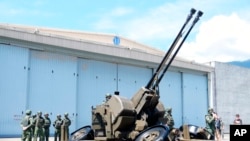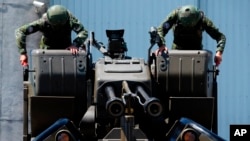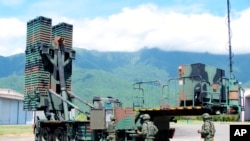As Chinese military exercises around Taiwan become the new normal, foreign companies are reassessing the risks and costs of doing business in Taiwan and maintaining supply chains that pass through or near the self-governing island that China considers its territory.
Neil Thomas, a senior China analyst at the Eurasia Group, a political risk consultancy, told VOA Mandarin that expanded People's Liberation Army exercises around Taiwan increase the risk of an accident or miscalculation that escalates into a prolonged military standoff or another type of international security crisis.
Thomas said in an emailed response that China's military exercises after U.S. House Speaker Nancy Pelosi visited Taiwan raise operational costs for foreign business “because they involved exclusion zones that forced planes and ships in the area to take longer routes to avoid these areas, adding time to supply chains and adding costs to trade.”
The Wall Street Journal reported that insurers are shying away from providing new policies to cover Taiwan-related political risk. It cited an insurance broker as saying that they are not providing policies to new clients “at least until things calm down somewhat.”
Pelosi visited in Taiwan on Aug. 2, defying threats by China, which she has long criticized for its record on human rights and democracy. In response, China launched live-fire military drills over seven swaths of water around the self-governed island, according to Taiwanese officials.
Rupert Hammond-Chambers, the president of U.S.-Taiwan Business Council, told VOA Mandarin that if things don’t calm down soon, most global companies will reconsider what it means to invest in Taiwan.
Christina Lai, a professor and assistant research fellow at Institute of Political Science at Academia Sinica in Taipei, told VOA Mandarin the recent incidents revealed a clear pattern of China’s coercive measures against Taiwan, which employ a combination of economic sanctions and military drills.
She warned that increasing levels of military confrontation might negatively affect Taiwan’s economy in the long run.
“For example, hundreds of flights have been canceled over the last week due to the PLA drill near the Taiwan strait,” she told VOA Mandarin via email. “If the Chinese navy ramps up its effort to … blockade, then the trade route connecting Northeast and Southeast [Asia] would be disrupted quickly. This would be the worst scenario that might seriously impact Taiwan’s trade volume and economic development.”
Others point out that China is not immune to the supply chain disruptions it creates by its own actions.
David Uren, a senior fellow at the Australian Strategic Policy Institute, said in a recent article that any disruption of the sea lanes to the east and west of Taiwan would have a crippling effect on China’s own economy, “since its major ports of Shanghai, Dalian, Tianjin and others are dependent on passage through waters near Taiwan.”
The Taiwan Strait, which separates Taiwan and continental Asia, is one of the world’s busiest trade routes for ships carrying goods between China, Japan, and South Korea, and the rest of world.
Taiwan's Ministry of National Defense said that every day this week, it has detected more than 15 People’s Liberation Army (PLA) warplanes and at least five vessels in the Taiwan Strait.
China's new round of exercises came in response to a visit Monday by a U.S. delegation led by Democratic Senator Ed Markey of Massachusetts.
On Tuesday, Vice Admiral Karl Thomas, commander of U.S. 7th Fleet, described China as the “gorilla in the room” ahead of the Southeast Asia Cooperation and Training naval exercise, commonly known as SEACAT.
“It's very important that we contest this type of thing. I know that the gorilla in the room is launching missiles over Taiwan," he said, adding it’s irresponsible for China to launch missiles over Taiwan into international waters.
Dale Buckner, CEO of Global Guardian, a security solutions firm headquartered in Virginia, said some of his largest clients are concerned about operating in Taiwan.
He said companies should start to examine their essential personnel in the region, their hard and soft assets, and if they have financial assets that are parked within the Chinese or Taiwanese system.
“I think if you're a leader, and you're thinking over the horizon — not only in the next 12,18 months, but the next decade — you have to be thinking about these things. I don't think currently my clients are in panic, but I think they're taking it very, very seriously. And they don't want to replicate what's happened between Russia and Ukraine on a much bigger scale,” he told VOA Mandarin via phone.
















